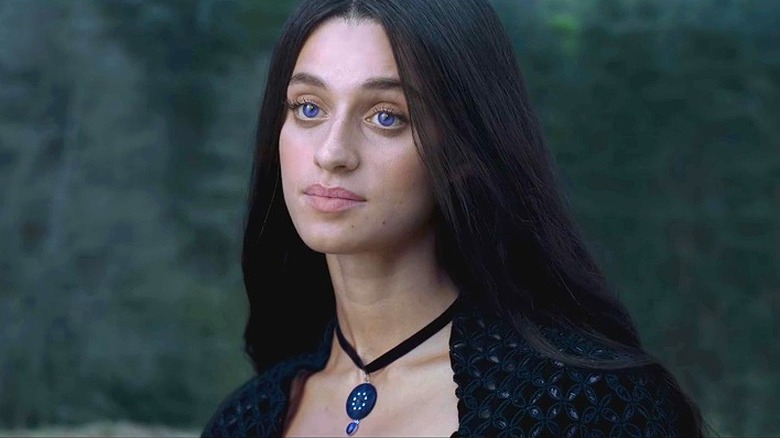The Witcher S3: Why Yennefer Calling Ciri 'My Ugly One' Is Actually Heartwarming
However you feel about the changes Season 2 of Netflix's "The Witcher" made to the relationship between Yennefer (Anya Chalotra) and Ciri (Freya Allan) compared to that presented in Andrzej Sapkowski's novels, it's safe to say Season 3 provides a dynamic that more closely resembles that of the mage and her charge in both "Blood of Elves" and "Time of Contempt." Not only does Episode 1 see Yennefer and Ciri grow into a more maternal-filial relationship (and begin to build a kind of complex family dynamic with Henry Cavill's Geralt), but Episode 3 in particular foregrounds Yennefer's evolving emotional capacity and aptitude. Though the series gives both characters a more tension-filled back-and-forth than we see in the books, it also draws heavily from Sapkowski's depiction — right down to its use of book Yennefer's nickname for her surrogate daughter: "my ugly one."
When Ciri asks Yennefer why she calls her that, her answer is similarly (though only seemingly) jab-laced: "Because I promised I'd be sincere with you from here forward." It's an ever-so-slight variation on her response in the books — "I promised to be sincere" ("Blood of Elves," p. 285) — but its ironic and affectionate intent is the same. Still, it's not exactly what one would call a typical term of endearment, and the fact that it's a translation from Polish has, for years, prompted some fans to question its ability to accurately and adequately portray Yennefer's meaning.
Some fans are wondering what's lost in translation
In a thread on the "Witcher" subreddit, fans discussed the possibility that the English translation doesn't quite get Andrzej Sapkowski's point across. In Polish, the word is "brzydulka," and although its straightforward, surface-level translation is indeed "ugly" (specifically with regard to a young girl), it's frequently used, as u/Finlay44 points out, as "a cordial pet name, so it becomes a private joke between the two people." In other words, the translation gap isn't in the word, but in how it's used and understood by American readers.
While a few fans were adamant that the translation itself is simply bad, most argued that the subtext is clear regardless. "Even translated to English language and other cultures one can read irony from the get-go in Yen using that pet name," wrote u/cdezero.
In truth, Yennefer's nickname for her charge has little to do with looks and everything to do with her assessment of another of Ciri's assets: her intelligence. Yennefer knows that Ciri is cunning enough to understand irony and — capable of being, at least — self-assured enough not to have to fish for compliments. And since the beautiful mage knows a thing or two about how ultimately unfulfilling good looks can be, she's not about to let this (very clearly, as she herself notes) beautiful young girl get in the habit of identifying too strongly with the power those looks have over others — particularly not when she possesses real powers. What's more, book Yennefer's insistence that Ciri not fake ineptitude plays a not insignificant role in her simultaneously didactic and playful use of the phrase.
Yennefer's universal subtext
Essentially, Yennefer trusts Ciri to be smart enough to understand both overt sarcasm and the affection conveyed by her addition of the words "my" and "one." Though the series — which more or less uses the exchange as a subtle nod to its source material — doesn't underscore this implication to the same degree as the books, an analysis of the latter reveals the sorceress' intent.
In "Blood of Elves," it's clear Yennefer's approach to her initially reluctant and insecure pupil borders on reverse psychology. When Ciri says she can't do magic because her friends told her magic doesn't have access to virgins, Yennefer says, "I can't see a solution. So go out and lose your virginity if it gets in your way so much. But be quick about it if you please" (p. 287). She's not about to entertain, as a more coddling instructor or parent might, the kind of half-feigned doubts and silly lines of inquiry in which children so often engage to garner sympathetic reassurance and attention.
Ciri knows better than to listen to such foolishness, and Yennefer's way of ensuring Ciri owns that intelligence is to treat her as though she's already grown into it. It's the tweenage equivalent of a parent saying, in a deadpan tone, "Well, I guess we have to go to the hospital now" when a toddler falls down and instinctively overreacts or cries despite not being the least bit hurt. Her nickname comes from a similar place, though its function evolves as both the pair's relationship and Ciri herself grow. American parents may not be in the habit of calling their child "my ugly one," but tongue in cheek is a relatively universal language — one Yennefer helps Ciri learn to speak.


